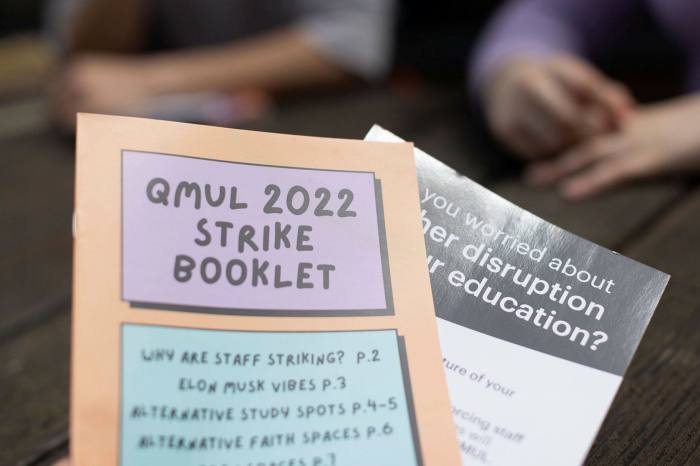Strikes, cancelled lectures, lost pay and pension cuts: it’s been a challenging year at Queen Mary University London.
Even good news about the value of the employee pension scheme — at the centre of the long-running dispute between staff and employers — has failed to repair fraught relations between academics and university administrations.
Students, who have lost valuable teaching time after two years of pandemic disruption, remain stuck in the middle. “I’m really unhappy with the situation,” said one first year English student who did not want to give his name. “Some students can self-manage their study, but others actually need the support.”
QMUL is one of dozens of UK universities to have faced disruption this year over changes to the University Superannuation Scheme, the UK’s largest private sector pension plan, and poor pay and conditions, resulting in acrimonious relations between academic staff and administrations.
Staff saw their guaranteed future pension payments slashed in April by an average of one-third according to their union, the University and College Union, to plug a £14bn-£18bn hole in the scheme identified after a contentious valuation in March 2020.
University staff charged that by carrying out the valuation in adverse market conditions at the height of the pandemic USS directors had not acted in their best interest, and voted to begin strike action.

Last week, an interim report by USS showed the funding hole had shrunk from £14bn to £1.6bn, with the scheme’s overall assets increasing in value by £22.3bn. Rising interest rates have also reduced the cost of future pension promises.
The recovery left academics feeling vindicated but frustrated that the increasingly acrimonious dispute is dragging on. UCU general secretary Jo Grady said it proved the valuation had “wildly underestimated the enduring strength of the scheme” and called on universities to take “urgent steps” to improve staff benefits.
And while employers insist that benefit cuts were partially responsible for the pension fund’s improvement, they also admit the scheme’s increased value meant they could reassess benefits for staff. “Consistently better” performance by the scheme “could make a real difference and allow for improved benefits, lower contributions, or a combination of both”, said Universities UK, which represents university vice chancellors.
At QMUL, UCU members hope the improved financial position will improve employees’ hand in negotiations with management. Branch organiser James Eastwood said he was hopeful that continued pressure on individual universities, including marking boycotts at QMUL and nearly 20 other institutions, would prompt individual employers to push USS to restore benefits.
“A negotiated outcome with the employer bodies looks more difficult, but there’s a lot more we can do locally,” he said.

But for students at QMUL this means the marking boycott, part of a series of rolling strikes this year that denied them weeks of lectures, will continue.
“We’re supportive of the reasons for the strikes but we’re still paying the same fees . . . we’re struggling,” said one first year neuroscience student who asked to remain anonymous.
Students and striking staff members are hoping that QMUL will follow other universities and push the USS to improve benefits as a way to end the dispute. Management and unions at institutions including Durham, Bristol and Loughborough have released joint statements arguing that the improvements to the pension pot should be used to improve member benefits.
In a joint letter, Oxford, Cambridge and Imperial College London also laid out concerns with the management of USS, recommending that it adjust its “risk metric” to focus more on benefits for staff regardless of adverse circumstances.
Mark Taylor-Batty, the pensions officer for UCU at the University of Leeds, said he was optimistic that more institutions would release joint statements as improved finances prompted university managers to reassess their positions.
In the meantime, students face the consequence of the disruption. Those in their final year now face the possibility of delayed graduation, and others are anxious about their studies after missing months of lectures.
As the marking boycott continues at QMUL and several other universities, managers are threatening to withhold 100 per cent of pay from staff that refuse to mark work, further souring industrial relations.
A spokesperson said QMUL’s “first priority” was protecting “all our students’ education and experience . . . and to uphold academic quality and standards”. They said that less than 2 per cent of staff had taken strike action.

But many QMUL students blame the continued disruption on the university administration. A third year campaigning in support of staff, who asked not to be named, said QMUL’s “draconian” handling of the dispute had increased sympathy for academics. “We know staff are going on strike for very good reasons,” he said. “There’s consensus the demands can be sorted out.”
Eastwood, of the UCU, said such student support, along with the improved financial performance of the pension scheme, meant staff would maintain their industrial action until benefits were improved.
“You can’t enjoy your job because you’re in a battle with your employer. People don’t like feeling like that — they like their students, their teaching and research,” he said. “But there’s a real determination to see it through.”


Comments are closed, but trackbacks and pingbacks are open.